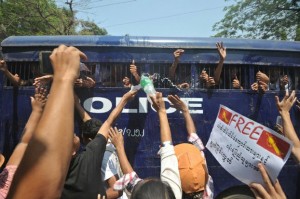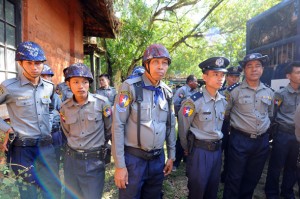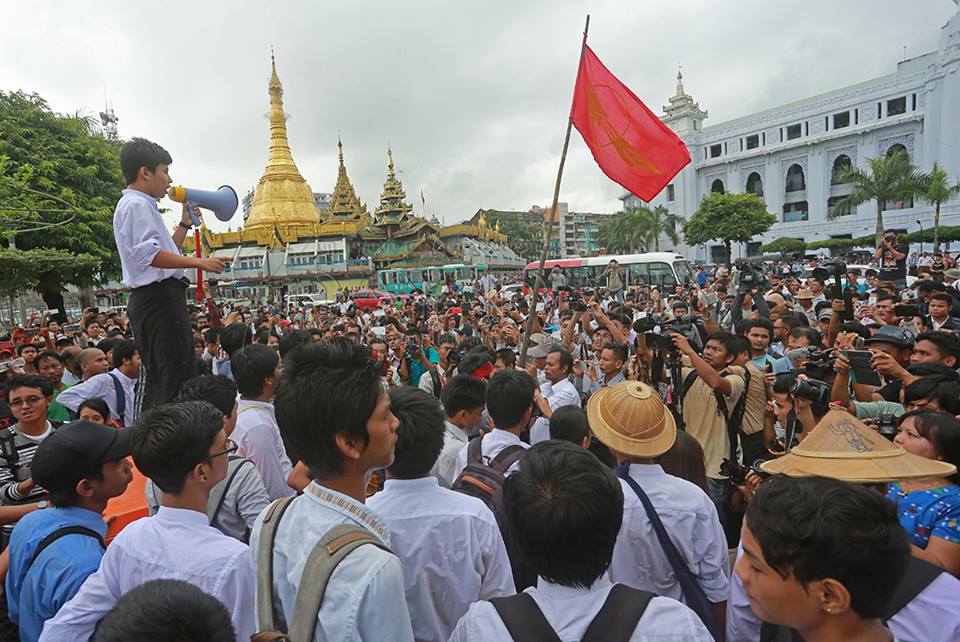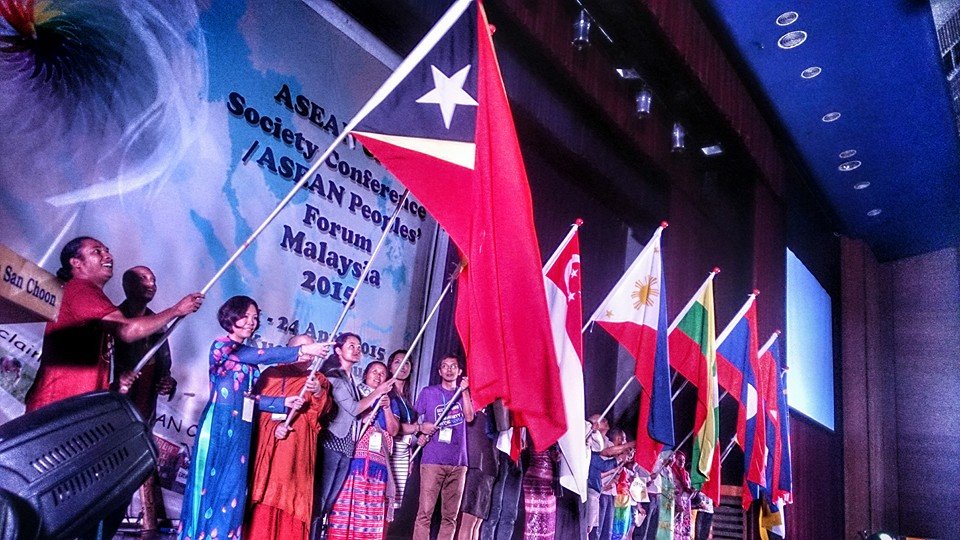Posts Tagged ‘Letpadan’ (17 found)
NLD Face Major Challenges as Lack of Rule of Law Perpetuates Impunity
 Just months before the end of the President Thein Sein Government, a series of events and issues publicized over the past week demonstrate the pressing need for reforms to establish rule of law in Burma […]
Just months before the end of the President Thein Sein Government, a series of events and issues publicized over the past week demonstrate the pressing need for reforms to establish rule of law in Burma […]
MNHRC at the Crossroads; “Alibi” of the Government or Ally of the People?
 Last week, a fact-finding mission comprised of the Asian Forum for Human Rights and Development (Forum-Asia) and Burma Partnership released a statement on the impact and effectiveness of the Myanmar National Human Rights Commission (MNHRC). The statement reflected the conclusions drawn from a mission conducted from 16-18 November, 2015. The statement noted serious concerns relating to issues of credibility, a lack of adherence to the Paris Principles, a failure to engage with repressive legislation in Burma, and an inability to effectively counter widespread human rights abuses such as land confiscation […]
Last week, a fact-finding mission comprised of the Asian Forum for Human Rights and Development (Forum-Asia) and Burma Partnership released a statement on the impact and effectiveness of the Myanmar National Human Rights Commission (MNHRC). The statement reflected the conclusions drawn from a mission conducted from 16-18 November, 2015. The statement noted serious concerns relating to issues of credibility, a lack of adherence to the Paris Principles, a failure to engage with repressive legislation in Burma, and an inability to effectively counter widespread human rights abuses such as land confiscation […]
Constitutional Crackdown Brings A Dark Day for Democracy in Burma
 After an increasingly dispiriting start to 2015, and with landmark national elections now likely only five months away, Burma’s flimsy “reform process” is unraveling inexorably. First there was the 10 March crackdown on the nationwide student protest movement at Letpadan, Bago Region; then the Committee to Protect Journalists’ revealed that, despite much-heralded media reforms in 2011, Burma featured yet again in its 2015 rogues’ gallery of top 10 most censored countries on the planet; more recently, the refugee crisis, triggered mostly by severe state and religious persecution of the Rohingya and other Muslim minorities in Arakan State, caught the world’s attention. Meanwhile, grave human rights abuses – including sexual violence – continue unabated in ethnic conflict areas, especially in war-torn Kachin State, parts of northern Shan State and Arakan State, bringing the total number of IDPs in Burma to over 660,000.
After an increasingly dispiriting start to 2015, and with landmark national elections now likely only five months away, Burma’s flimsy “reform process” is unraveling inexorably. First there was the 10 March crackdown on the nationwide student protest movement at Letpadan, Bago Region; then the Committee to Protect Journalists’ revealed that, despite much-heralded media reforms in 2011, Burma featured yet again in its 2015 rogues’ gallery of top 10 most censored countries on the planet; more recently, the refugee crisis, triggered mostly by severe state and religious persecution of the Rohingya and other Muslim minorities in Arakan State, caught the world’s attention. Meanwhile, grave human rights abuses – including sexual violence – continue unabated in ethnic conflict areas, especially in war-torn Kachin State, parts of northern Shan State and Arakan State, bringing the total number of IDPs in Burma to over 660,000.
AAPP calls for adequate healthcare for political prisoners in Burma
The Assistance Association for Political Prisoners (Burma), also known as AAPP, has received reports over recent months regarding the deterioration of the health of several political prisoners in Burma’s prisons, raising serious concerns […]
• • •Woman Activist in Burma Jailed with Hard Labour for Protesting Peacefully – Free Naw Ohn Hla (Again)
Burma Campaign UK today urged Foreign Office Minister Hugo Swire MP to call in the Burmese ambassador to Britain to question him regarding why people are still being arrested under the so-called right to protest law in Burma. Burma Campaign UK also urged the Foreign Office Minister to demand the military-backed government to reform the Prisoners of Conscience Affairs Committee, and ensure the immediate release of Naw Ohn Hla and the remaining political prisoners in Burma […]
• • •Marching to the Same Tune? A Briefing Paper on Protests and Freedom of Assembly in Burma
 Background
Background
Facilitated by the proliferation of social media as an agent for social and political change over the last five years, mass organized protests have simmered and erupted across the globe. From the 2011 “Arab Spring” in the Middle East and North Africa, to the Occupy Movement in Western cities, from the 2013 Maidan Square Revolution in Ukraine, to the recent Umbrella Revolution in Hong Kong, from stifled democracy movements in Iran, Russia and Cambodia, to austerity protests in southern Europe and the 2014 race protests in Ferguson, Missouri, United States, mass protests have been a defining feature of the decade thus far. Neither is Burma a stranger to mass public protests, especially given its history of the pro-democracy student uprising in 1988 and the monk-led Saffron Revolution in 2007. While it is still premature to claim that 2015 has been another key protest year in Burma, on a par with 1988 and 2007, protests have nevertheless dominated the headlines so far this year […]
• • •Hopes Shattered a Year on from Burma’s ASEAN Chairmanship
 The Association of Southeast Asian Nations (ASEAN) Civil Society Conference/ASEAN Peoples’ Forum 2015 (ACSC/APF) ended on 24 April 2015 in Kuala Lumpur, Malaysia, bringing the voices of the people of ASEAN together in its yearly three day event. It reminds us of the historic ACSC/APF 2014 that was held for the first time in Burma and the hopes raised and duly dashed since that forum in the past year. As civil society throughout the region strives for better promotion, protection and respect for human rights, a review of the human rights situation and democratic reforms in Burma over the past year represent dreams turning into nightmares.
The Association of Southeast Asian Nations (ASEAN) Civil Society Conference/ASEAN Peoples’ Forum 2015 (ACSC/APF) ended on 24 April 2015 in Kuala Lumpur, Malaysia, bringing the voices of the people of ASEAN together in its yearly three day event. It reminds us of the historic ACSC/APF 2014 that was held for the first time in Burma and the hopes raised and duly dashed since that forum in the past year. As civil society throughout the region strives for better promotion, protection and respect for human rights, a review of the human rights situation and democratic reforms in Burma over the past year represent dreams turning into nightmares.
Events at the ACSC/APF 2015 involving Burma included a theatre play by Burma’s students and youth depicting the events of Letpadan, where over 100 students and supporters were detained after a violent attack by police and hired thugs on the column of students marching from Mandalay to Rangoon. The play called for the government to release the 79 student protesters and their supporters that remain in jail. The ASEAN Youth Forum labelled this strive for education reform by Burma’s students as an “endless and painful struggle.” Events brought to mind previous student demonstrations and consequent crackdowns such as in 1974, 1988 and 1996, all of which were committed by overtly military regimes. It begs the question; what has changed? […]
• • •Myanmar: End Clampdown on Student Protesters and Supporters
Authorities in Myanmar must end their on-going clampdown on student protesters and their supporters, said Amnesty International today […]
• • •Statement of Detained Students
First of all, we would like to express our deep gratitude to the people and civil society groups for supporting our peaceful protests […]
• • •HRC28, Item 4 : Interactive Dialogue with the UN Special Rapporteur on the Situation of Human Rights in Burma/Myanmar, Ms. Yanghee Lee
8th Regular Session of the UN Human Rights Council Oral Statement Delivered by Khin Ohmar on behalf of Asian Forum for Human Rights and Development (FORUM-ASIA) […]
• • •








 All posts
All posts